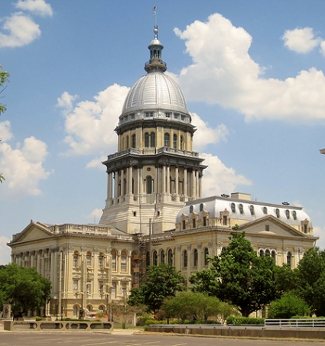Chris Gilson looks at the best in political blogging from the Beltway and across the States.
The rollout of Affordable Care
After the end of the government shutdown last week, attention turned towards the rollout of health insurance exchanges as part of the Affordable Care Act (Obamacare). As the week begins, Via Meadia says that the main concern is whether or not enough young adults will sign up for insurance, something that is very important for the sustainability of the system. Meanwhile, The Foundry says that Obamacare is a threat to marriage, as it provides less support to married couples than those who are cohabiting.
One of the main critiques of Obamacare this week was the inadequacy of the program’s website, healthcare.gov. The White House Dossier ponders whether or not the shutdown campaign forced the administration to rollout the website prematurely, as delaying it would have looked like a cave-in to GOP demands. On Monday, The Lonely Conservative writes that the website has around 5 million lines of programming code that needs to be rewritten so that users are able to register without difficulty. On similar lines, Hit & Run says that, while Obamacare is more than a website, it needs that website to function – especially as paper and phone based applications must still be entered into the poorly functioning online system. On the other side, the National Journal argues that the rough start to the insurance exchanges does not matter as enrolment was expected to be low in October, with peaks likely in December and March, before benefits and the individual mandate begin, respectively. Daily Kos echoes this on Wednesday, saying that polls are showing a slow increase in net approval for Obamacare. Meanwhile, Wonkblog says that the problems of the Obamacare website are indicative of why the way that the government does tech is outdated and risky.

This week, the Secretary of Health and Human Services, Kathleen Sebelius, came under a great deal of criticism from conservative groups for the rollout of the Obamacare website. American Thinker notes that not much has been seen of her recently and that she needs to ‘open up’ and admit that something has gone wrong. United Liberty says that Sebelius has clearly failed at her job, and should be fired and replaced with former Republican Presidential candidate, Mitt Romney, who they say has experience turning around failed national projects and reining in out of control budgets.
On Wednesday, Crooks & Liars writes that House Speaker John Boehner has been quoted as saying that Obamacare is “continuing to hang over our economy like a wet blanket”, an ironic statement, they say, given that Republicans recently hindered the economic recovery by shutting down the federal government.
Government and the Beltway
On Sunday Political Carnival looks at how another shutdown could be avoided, including adopting a measure used in some states of carrying over the previous year’s budget until a new spending plan is passed. The American Prospect is worried at what might happen in the coming budget negotiations, which need to be resolved by December 13th. They say that a new ‘grand bargain’ might mean more spending on the military and cuts to Medicare and Social Security – hardly a good deal for the Democrats. The Hill’s Congress blog makes the point that during the shutdown, energy production on federal lands was subjected to greater delays and impediments than normal, and that even in times of normal government operation, drilling and energy extraction activities are slowed down or event blocked by the government.

Republican Senator Ted Cruz of Texas came out of the shutdown very well, at least in the eyes of far right Republicans. The National Journal looks at who is jockeying to be the ‘next Ted Cruz’ in the coming 2014 elections. Meanwhile, Wonkblog wonders whether or not the rise of the Tea Party is making the U.S. seem like a less safe investment in the long term. While many are predicting poor performances for the GOP in 2014’s Congressional elections as a result of their role in the government shutdown, especially in light of current low polling, Outside the Beltway argues that it is too early to tell what the real impact will be. On the other hand, The Monkey Cage says that it may take fewer votes for the Democrats to retake the House of Representatives in 2014, than is generally thought, as Democrats are more likely to field high quality candidates and put more resources towards taking swing seats. Roll Call writes that the political middle in U.S. politics has more or less disappeared, especially compared with the 1980s.
The Foundry takes a look at President Obama’s nominees for Federal Courts, saying that he has had twice as many confirmed as had George W. Bush during the same period of his second term.
Since the end of the government shutdown, it is likely that Congress will soon turn to immigration reform, with President Obama making a speech to that effect this week. Red State says that there is no way that Republicans can pass immigration reform under current proposals, especially as they include an amnesty for undocumented immigrants.
Foreign policy
This week saw more revelations about the scale of U.S. surveillance and spying on its allies. On Wednesday, evidence comes to light that the National Security Agency may have targeted the German Chancellor, Angela Merkel’s cellphone, according to Hit & Run. The Monkey Cage says that the scandal paves the way for a confrontation between the EU and U.S. over privacy laws. They also write that such revelations mean that the U.S. is losing its hypocrisy advantage – as it is now more difficult for the country to reconcile its private behaviour with its public ideals. Via Meadia writes that the spying revelations show that the government needs to think long and hard about the appropriate limits of its surveillance technology.
In recent years America has been criticised by many for its use of unmanned drones. Citing a recent report from Amnesty International, The Atlantic says that the U.S. should apologise when innocent civilians are killed in drone strikes. Meanwhile, Hit & Run looks at Saudi Arabia’s displeasure with the U.S. for not having an aggressive enough foreign policy.
The economy and society
One of the most pressing concerns facing the American government is the country’s debt ceiling, which will have to be addressed again in early February, 2014, following last week’s deal. The Monkey Cage argues that the debt ceiling risks turning the U.S. “into an economic turkey”, as foreign countries increase their scrutiny of America’s fiscal governance.
The Lonely Conservative writes that the U.S. has spent $3.7 trillion on welfare in the past 5 years, and wonders how long this rate of spending can be kept up. Meanwhile, Daily Kos says that it is the minimum wage’s 75th birthday this week – but also, adjusting for inflation, it is now equal to what it was in 1950.
On Thursday, Via Meadia looks at the delays to the approval of the Keystone XL pipeline, which is intended to carry oil from Alberta’s tar sands to refineries on the Gulf Coast. They say that the pipeline should not be taking so long to be approved, given the clear economic rationale. Wonkblog writes that the current boom in the exploration and use of shale gas will not do a great deal for climate change, but it will make us richer.
Across the States
Northeast
Crooks & Liars reports that this week, after Republican Governor Chris Christie dropped a legal case, New Jersey now allows same-sex marriages. They write that Governor Christie may have realized that he was on the wrong side of history with his opposition. Still on Christie, Politicker NJ looks at his fight with the Libertarian wing of the GOP in the wake of the defeat of the Republican candidate for the New Jersey Senate seat last week.
Ahead of the New York mayoral election on November 5th, New York State of Politics reports that the Democratic candidate, Bill de Blasio, has an enormous 44 percent lead over Republican Joe Lhota.
South
In early November, Virginia will go to the polls to elect a new Governor. Daily Kos says that the election will give an early indication of the political fallout from the government’s shutdown. With the Democratic candidate, Terry McAuliffe, leading the polls, they are also very positive about potential Democratic gains in the state legislature as well. On Thursday night, McAuliffe and his Republican rival, Ken Cuccinelli had their final of three debates. Virginia’s Bearing Drift calls the debate for Cuccinelli, saying that McAuliffe’s comments on gun control revealed that he does not care about the Second Amendment.
The Foundry looks at the high cost of Obamacare for one business in Texas, which says it will be facing insurance premium increases of around 200 percent. Burnt Orange Report says that Texas Governor, Rick Perry is actually encouraging people to enrol in Obamacare health insurance exchanges, and accepting federal funding for them, something that is rather hypocritical of him, given his opposition to Obamacare. Still in Texas, Crooks & Liars reports that the state’s new voter ID laws, which require an up-to-date photo ID, will disproportionately affect women.
Outside the Beltway reports that the Tea Party challenger for Mississippi’s Senate seat in 2014, Chris McDaniel, has ties with neo-Confederate and secessionist groups.
Midwest

Progress Illinois reports that the state’s government wants unemployment benefits back from the 577 federal workers that were furloughed during the government’s shutdown, totalling $231,000.
Uppity Wisconsin says that the state’s Democrats are dismayed by their candidate for the governorship in the 2014 election, who has announced this week that she would not roll back the current Governor, Scott Walker’s state-wide school voucher program. Meanwhile, The Prairie Badger reports that Governor Walker is under investigation again for alleged illegal activities, such as campaign violations.
Missouri’s PoliticMO says that Democratic Governor Jay Nixon has now scrapped his controversial plan to reduce the number of people in his state that were eligible for food stamps by nearly 60,000.
West and Pacific
Washington’s state legislature recently enacted a law to legalise marijuana in the state, so it can be sold in state-licensed stores. Hit & Run wonders how much it will cost in the state, once sales start, sometime next year. Daily Kos looks at the recent moves to institute a $15 living wage in the SeaTac community, near Seattle.
In California, workers at the Bay Area Rapid Transit (BART) in San Francisco have been on strike several times this year. Flashreport says that these strikes are a ‘teachable moment’, in that they show the power of public sector unions, and the political influence that they can wield. Still in California, Fox & Hounds advocates for neighborhood level legislatures in the wake of the federal government’s shutdown, which would lead to a more personal relationship between voters and candidates.
Desert Beacon bemoans the state’s gun laws which do little to address the safe storage of firearms, as well as children’s’ access to them.
In Alaska, The Mudflats covers protests against the Governor, Sean Parnell, who’s administration is trying to recoup legal fees from an elderly residents opposed to a mining project.
Hawaii’s Honolulu Civil Beat reports that support for same-sex marriage in the state is growing, with 44 percent now in favour of a law change.
And finally…
United Liberty reports that former Governor of California, Arnold Schwarzenegger, still has Presidential ambitions in 2016, and is lobbying for a law change that only allows natural-born citizens to become President.
Outside the Beltway says that America’s first super carrier, the U.S.S Forrestal, launched in 1954, has been sold for scrap for one penny.
Please read our comments policy before commenting.
Note: This article gives the views of the author, and not the position of USApp– American Politics and Policy, nor of the London School of Economics.
Shortened URL for this post: http://bit.ly/1apPgk5






